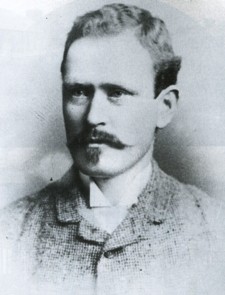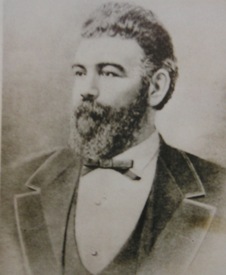“Any dead fish can swim with the stream, but it takes a real live one to go against the current.” So said the Hon. Mike Walsh.
Mike Walsh never had to proclaim he was his own man. In the politics of antebellum New York City, being a Democrat was merely an expression of a sentiment. One’s faction was more definitive—Tammany, with its Softshells (favoring compromise when necessary) and Hardshells (uncompromising conservatives); Loco-Focos (named for the matches that iluminated their meeting after Tammanyites shut off the gas); Hunkers (who hunkered after office), and Barnburners (reformers so extreme they would burn down the barn, i.e., destroy the party, to kill the rats in it).
Then there was Walsh. M.R. Werner, in Tammany Hall, calls Walsh “formidable and picturesque.” He was, and more. Mike Walsh was the city’s most successful radical politician before the Marxists transformed American left-wing politics into a parlor game. He was a rabble-rousing militant and an enemy of corruption. He was also a funny, vitriolic orator and journalist, for whom excoriating the city’s elite as “rat-faced swindlers,” “cowardly, hang-dog, state’s evidence ruffians,” “sneaking, pimping, red-haired little scamps” and “an imbecile lump of mere organized animal matter” was merely a day’s work.
Walsh was born in Youghal, near Cork, Ireland, on May 4, 1810. He immigrated with his parents, who settled in New York City. He became a reporter on the New York Aurora, then edited by Walt Whitman, and drifted into politics. He was first elected to the state Assembly in 1839. A year later, he founded the Spartan Association, which according to Luc Sante “partook equally of the political club, the fraternal order, and the gang, although it had…a deliberately proletarian cast to it.”
According to Gotham, by Edwin G. Burrows and Mike Wallace, “scores of gangs crystallized” during the depression of the late 1830s. Then as now, gangs provided fellowship and a sense of control over one’s life. They valued the qualities bourgeois society devalued: muscular prowess, masculine honor, swaggering bravado and colorful display. Walsh’s talents with voice and pen were equaled by those of his fists, and the Spartans became very effective. In 1840, he smashed up Whig headquarters at the head of 40 club-wielding Spartans. In 1841, he led some 300 Spartan shoulder-hitters into Tammany’s general convention and seized the stage. Having fought his way to the rostrum, Walsh denounced Tammany’s leadership as “a few unprincipled blackguards, usually office-holders or office-seekers, who meet in the back room of some low groggery, where they place upon a ticket for the support of their fellow-citizens a number of wretches of their own moral caliber, whose characters and consciences have been so long buried that they have become putrid…” At this point, according to Walsh himself, there were “tremendous cheers, and hisses, mingled with cries of ‘go it Mike, go it my hero, give it to ’em,’ with counter-cries of ‘turn him out, throw him out of the window, pull him off the stand.'”
Walsh roared at the Tammanyites, “Come up; come up here, you craven cowardly scoundrels…and pull me off yourselves.” He turned to his followers and shouted, “Is this not a pretty scene, there now are…the very stool pigeons and thieves I have just been describing!” He turned back to his foes, shouting, “You have men to contend with here! Not poor destitute and forlorn wretches… I…tell you that Tammany Hall belongs to us-and…we are determined to keep possession of it until you are able to dispossess us-and that I believe is as good as a lease for life, isn’t it, boys!” The hall was filled with “terrific cheering, hisses, and cries of ‘yes,’ mingled with ‘go it Mike,’ ‘turn him out’, etc., which finally ended in two or three beautiful fights.”
Tammany regrouped and nominated its slate. The Carroll Hall ticket, organized by Roman Catholic Bishop John “Dagger John” Hughes, nominated Walsh for Congress. Walsh polled about 15 percent of the vote in a three-way race.
In 1843, in partnership with George Wilkes, a pimp and blackmailer who later founded the National Police Gazette, Walsh started The Subterranean. Its motto was “Independent in everything-neutral in nothing.” On its masthead appeared the all-seeing eye with the warning, “Knaves and Tyrants Beware, This is Upon You.”
Walsh was a working-class punk, a raffish, swaggering, proletarian dandy who used slang, as Sante put it, “like any tramp who had graduated from the gutter,” and combined ragged clothes with diamond rings and a silver-knobbed cane. He condemned corruption: “I tell you now, and I say it boldly, that in the body politic of New York there is not political or personal honesty left to drive a nail into to hang a hat on.” He named and blasted the “wire-pullers” that elected corrupt hacks to hand out city or state contracts to their friends. He decried excessive campaign spending, which meant no one could get elected who wasn’t already rich or had not “basely [sold] himself to corrupt and wealthy men.”
He believed Tammany used pseudo-populist rhetoric to betray the larger interests of working people: “There are many men in the party who fawn upon us and call us the bone and sinew of the country…who would use us until there was nothing but bone and sinew left of us.” Once, when Walsh was inciting a mob by describing the wrongs the politicians had inflicted upon them, someone shouted, “We’ve stood it too long.” “All I’m afraid of,” Walsh replied, “is that you’ll stand it too much longer.”
The fact was, he insisted, “no man can be a good political democrat without he’s a good social democrat.” He may have foreseen our President’s $100,000-a-plate black-tie fundraisers when he wrote of a Tammany reception, “…if a ragged or illy-dressed member of the unterrified should chance to intrude, he would excite as much seeming curiosity and astonishment amongst the regular visitors, as a wild Winnebago would in the streets of Constantinople.
“But how striking the change is during the excitement of elections. Then…applicants for office seem to vie with each other in their unqualified admiration of men with patched clothes and empty stomachs. How sudden-how palpable is the condescension of pompous, arrogant, nabobs on these periodic occasions!”
After describing a mass Tammany reception at which he found the police chief, “two Aldermen, and an ex-Mayor, dancing to the tune of ‘The devil among the tailors,’ which old Nexan was playing pretty correctly for a man so far gone in liquor, on a second-hand jew’s harp,” he continues, “There is something, even to a rigidly temperate individual like myself, truly exhilarating in these scenes of jovial and glorious equality, which is only marred by reflecting on the shortness of its duration.”
In 1845, The Subterranean, Walsh and Wilkes, his coeditor, were successfully prosecuted for criminal libel, and the paper folded. Wilkes, as an admirer put it, had “printed the poetic truth, if not always the actual truth.” Nonetheless, Mike fought his way back into the Assembly in 1846. Walsh described the convention: “About seven o’clock p.m., I stepped into my residence-I’m never ahead of time, though always on hand-washed my face-put on a clean shirt-blacked my old boots…and started for Tammany Hall in company with myself. Here I…found some six or seven thousand persons at least, all of whom were roaring out all sorts of noises at the top of their voices, and pulling, hauling and fighting as hard as they could. I pushed through the tumultuous crowd as fast as I was able, and was greeted at every step by some warm-hearted and enthusiastic disciple… As soon as I reached the stand I was hailed by the assembled thousands beneath, with a deafening, soul-cheering round of applause, such as Tammany Hall or no other Hall ever rang with before… From the moment I was first seen upon the stand they would hear nobody nor listen to anything but…‘Walsh,’ ‘Walsh,’ ‘Mike,’ ‘Mike,’ ‘Walsh, Walsh,’ ‘Nobody but Mike, the poor man’s well-tried friend,’ ‘Mike, they can’t buy you from us,’ ‘You’re the only man amongst them we’ve got confidence in, and you’re the only one we’ll listen to,’ and a thousand similar declarations were heard from all parts of the room…
The calls for me now became truly terrific and thinking it about time I should put a stop to the insulting mummery, I stepped forward, and after ordering…one or two loafers out of the road, so as to have plenty of elbow room, I commenced a speech which was listened to with the most breathless attention for an hour or two, unbroken by any interruptions save the thundergusts of applause… At the conclusion of the speech, which had to be prolonged much longer than I intended, in consequence of the repeated, deafening, and irresistible cries of “go on,” “go on,” nine tremendous cheers were given for ‘Mike Walsh, the poor man’s friend,’ and “Champion of the Young Democracy.”
Walsh won another term in the Assembly in 1848. Around this time, according to E.J. Edwards in McClure’s Magazine, Captain Isaiah Rynders decided to murder Park Godwin, a New York Post editor, because Godwin had denounced him in the paper. Godwin was snacking at the oyster bar in Florence’s Restaurant when he noticed Mike Walsh beside him. Walsh murmured, “Go on eating your oysters, Mr. Godwin, but do it as quickly as you can and then go away. Rynders and his men have been waiting here for you and intend to kill you, but they won’t attack you as long as I am by your side.”
After Godwin had left, Rynders walked up. He said, “What do you mean by interfering in this matter? It is none of your affair.”
Walsh replied, “Well, Godwin did me a good turn once, and I don’t propose to see him stabbed in the back. You were going to do a sneaking thing; you were going to assassinate him, and any man who will do that is a coward.”
“No man ever called me a coward, Mike Walsh, and you can’t.”
“But I do, and I will prove that you are a coward. If you are not one, come upstairs with me now. We will lock ourselves into a room; I will take a knife and you take one, and the man who is alive after we have got through, will unlock the door and go out.”
They went to an upper room. Walsh locked the door, gave Rynders a large bowie knife, took one himself, and said: “You stand in that corner, and I’ll stand in this. Then we will walk toward the center of the room, and we won’t stop until one or the other of us is finished.” Each took his corner. Rynders did not stir. “Why don’t you come out?” said Walsh. Rynders said, “Mike, you and I have always been friends; what is the use of our fighting now? If we get at it, we shall both be killed, and there is no good in that.” Walsh looked at Rynders with contempt. Then he said: “I told you you were a coward, and now I prove it. Never speak to me again.”
In 1852, Mike Walsh was elected to the 33rd Congress. Walsh felt antislavery agitation allowed rich reformers to strike virtuous poses while avoiding his constituents’ real issues: the imbalance of wealth and power, wage slavery and conditions of work. In Congress, he wasted his time denouncing Free Soilers. In 1854, “Honest John” Kelly, the future Tammany boss, defeated Walsh by 18 votes. After his defeat, Mike became an alcoholic. On March 17, 1859, Walsh was found dead on 8th Ave. after a binge. Someone had rifled his pockets. His remains lie in Green-Wood Cemetery, Brooklyn, Plot 7517, Section 2.
New York Press, September 26, 2000

